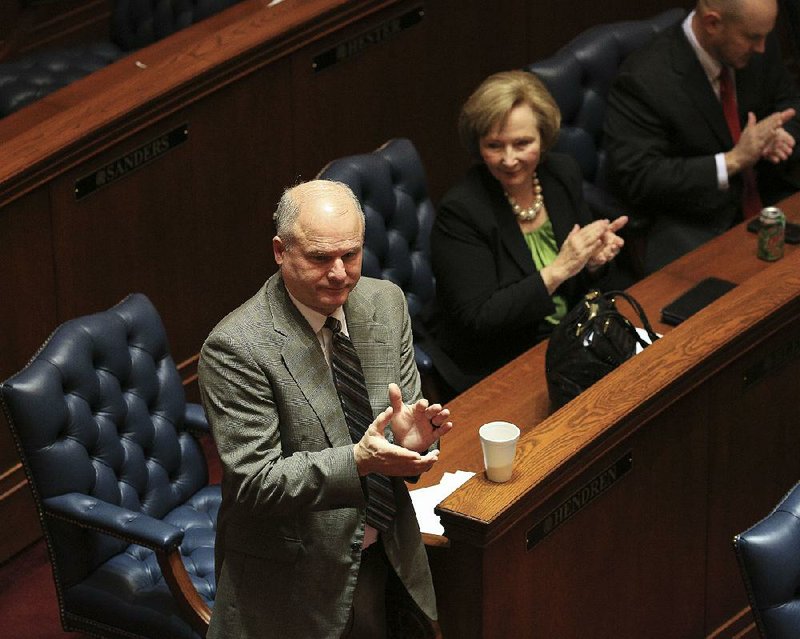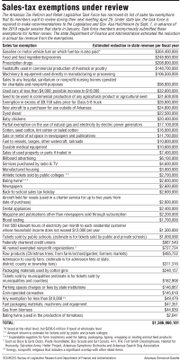The Legislature's tax overhaul task force has whittled down its list of existing sales-tax exemptions that it plans to review later this month, and, according to state estimates, the 43 exemptions together reduce tax revenue by about $1.3 billion a year.
The task force is reviewing tax laws with an eye toward proposing changes to be considered in the January legislative session.
The items on the list posted on the Arkansas General Assembly's website during the past week range from the partial sales-tax exemption for groceries to various exemptions for agriculture, manufacturing and motor fuels.
The 16-member task force will consider each item on the list and allow for public testimony during its April 25 meeting, said a task force co-chairman, Sen. Jim Hendren, R-Sulphur Springs.
"The public deserves the right to know and have comment," Hendren said in an interview Wednesday.
During the panel's March 20 meeting, the other co-chairman, Rep. Lane Jean, R-Magnolia, announced about four dozen exemptions that he said task force members listed on sheets of paper and submitted to the staff to be placed on the list for further review.
What is unknown is who suggested which exemptions.
In response to this newspaper's request on March 20 for copies of the documents submitted by lawmakers, Bureau of Legislative Research Director Marty Garrity said the records requested are exempt under Arkansas Code Annotated 25-19-105 (b) (7), which exempts the "unpublished memoranda, working papers and correspondence of ... members of the General Assembly" or Code Annotated 10-2-129, under which certain communications between members of the General Assembly and their staff members are protected and confidential.
The task force -- called the Arkansas Tax Reform and Relief Legislative Task Force under Acts 78 and 79 of 2017 -- has drawn fire from Jan Morgan of Hot Springs, who is challenging Gov. Asa Hutchinson in the May 22 Republican gubernatorial primary.
The task force was created to placate some lawmakers who want additional individual income tax cuts, particularly for people with more than $75,000 a year in taxable income. Under state law, the task force is required to issue a report to the Legislature and Hutchinson by Sept. 1.
Two months ago, Hutchinson announced that he wants the Legislature in 2019 to cut the top individual income tax rate from 6.9 percent to 6 percent, which he projected would reduce state tax revenue by about $180 million a year.
Last month, two tax experts recommended that the task force consider expanding the sales tax base by repealing exemptions and expanding the sales tax to more services. But they disagreed over whether the increased revenue should be used to further cut income tax rates or reduce sales tax rates.
"Look at the governor's tax reform commission," Morgan said in a recent interview.
"It is not there to reform the tax burden. It is not there is find ways to lighten the tax burden on people. Look at what they have done. There are looking for more ways to squeeze blood out of the turnip," she said.
"Look at all their recommendations, here's some exemptions, look at all of these possible exemptions [they] can repeal. ... I am sitting here going oh boy, this is going to make the farmers really happy looking at all the agriculture-related exemptions they are talking about repealing. ... OK, we can repeal those here so we can say we are cutting more there," Morgan said. So far, she has declined to disclose her plans to cut taxes if elected in November.
Hutchinson campaign spokesman Jamie Barker said Wednesday that "the governor has stated repeatedly that he wants to cut the top income tax rate in Arkansas from 6.9% to 6.0%.
"This is to make the state more competitive in retaining talent in the state and recruiting new business. Most importantly, it is the right thing to do for the taxpayers," Barker said in a written statement.
"The Tax Reform and Relief Task Force is a creation of the Legislature. The governor has no appointments on the task force, but he knows its work is important on the best ways to be competitive in lowering our tax rates," Barker said.
"Our tax code must be reformed to make our state more competitive and that starts with a review of every part of the code. Mrs. Morgan's attack on the governor's conservative approach to tax reform is a misrepresentation of the facts," Barker said.
In 2015 and 2017, the Republican-controlled Legislature enacted Hutchinson's plans to cut individual income tax rates for Arkansans with taxable income up to $75,000 a year. The two cuts are collectively projected to reduce revenue by about $150 million a year.
Hendren, whose uncle is the governor, said Morgan's comments "clearly show a misrepresentation of the process.
"This is a legislative effort," he said, adding Hutchinson had nothing to do with the appointment of members.
"Our job is not to figure out how to generate more revenue for the state and raise taxes," said Hendren.
He said the task force is aiming to overhaul the state tax code and provide tax relief and not to squeeze blood out of a turnip.
Hendren said he hopes the task force recommends tax cuts that make sense and don't get the state into a fiscal bind, but also make the tax code fairer and simpler.
Most sales-tax exemptions are in state law for a pretty good reason, he said.
"I don't think anybody needs to panic unless their exemption doesn't make sense," Hendren said.
Arkansas Farm Bureau spokesman Steve Eddington said the bureau supports the task force's work.
"As evidenced by its recommendation of more study, there are many layers to explore with tax exemptions, including tax policies from neighbor states, past taxation decisions, other taxation rates that impact business costs, etc.," Eddington said in a written statement.
"That said, Arkansas Farm Bureau policy states, 'We vigorously oppose any attempt to remove sales tax exemptions on agricultural production input items and support inclusion of other agricultural input items not currently exempt,'" Eddington said.
In December, Jean told Arkansas Farm Bureau members during their annual convention that he's going to side with job creators and food and timber producers as the panel reviews existing tax exemptions.
"But ... we certainly don't need to hurt our farmers, our ranchers [and] our timber producers. We don't need to hurt our manufacturers because those are the jobs that we need in this state," said Jean, who described himself as an "ag guy" who has interests in cattle farming, timber and real estate.
Some task force members have tossed around the idea of either modifying or repealing the reduced sales tax on groceries and creating an earned income tax credit or a sales tax credit to target tax relief to low-income Arkansans and using some of the increased revenue to cut income taxes. But Hendren said, "There is no agreed-upon plan or predetermined plan that I am aware of. We know it is going to be a controversial thing."
The state would need a more targeted tax credit for the poor or a way to hold the poor harmless from modifying or repealing the reduced sales tax on groceries, he said.
At the direction of then-Gov. Mike Beebe, a Democrat, the then-Democrat-controlled Legislature gradually cut the sales tax on groceries from 6 percent to 1.5 percent between 2007 and 2011.
The state Department of Finance and Administration estimated that the 1.5 percent sales tax rate on groceries reduced collections by $248 million, including $190 million in general revenue, in fiscal 2017. A 2013 state law will further reduce the grocery sales tax to 0.125 percent, starting Jan. 1. The cut will be offset by the state no longer paying $60 million a year in desegregation payments to Pulaski County school districts.
Rich Huddleston, director of the Arkansas Advocates for Children and Families, said in a written statement, "We would be open to reconsidering the phase-out of the grocery tax, but only if the revenue savings were put into a targeted [earned income tax credit] for working families and back into the budget to fund critical programs for children and families."
A Section on 04/06/2018


